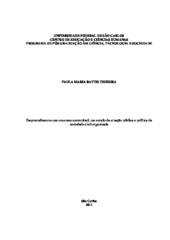Empreendimentos em consumo sustentável: um estudo da atuação pública e política da sociedade civil organizada

Ver/
Fecha
2011-02-24Autor
Teixeira, Paula Maria Rattis
Metadatos
Mostrar el registro completo del ítemResumen
Modern society has assumed over the years a consumption behavior pattern incompatible with a limited resources planet. In response to the consumerism negative impacts initiatives emerges to promote different standards and levels of consumption, contributing to sustainable consumption strengthening. Sustainable consumption is a controversial concept when appears in both academic and media texts. The sustainable consumption promotion requires action from civil society, governments, research centers, companies and industries. This research (a) discussed the meaning of sustainable consumption ; (b) investigated if there are civil society organizations engaged in publics and collectives actions to promote new standards and levels of consumption; (c) and examined the profile of these organizations called sustainable consumption organizations. We used a descriptive research to answer these questions that (a) sought to understand the meaning of sustainable consumption from a literature review; (b) gathered public information about civil organizations in five different sources of data collection on the internet and evaluated if these organizations were sustainable consumption organizations using ten pre-established guidelines criteria; (c) and drew these organizations profiles using five categories of analysis. The results showed that sustainable consumption is configured as a broader concept than other related terms such as green consumption, conscious consumption, ethical and solidarity consumption and responsible consumption. The results also showed that the sustainable consumption requires policy and collective actions from consumers (in this case citizens); involves the ecological, social, economic and political sustainability dimensions and focuses technological innovations followed by changes in individual behavior of consumption. We identified seventy-two sustainable consumption organizations. Analyzing the profile of forty of them it was possible to point out that sustainable consumption organizations have a close relationship with Solidarity Economy and Agroecology Movements. It was also possible to check that the political activity of these organizations takes place predominantly through the realization of sustainable collective purchasing and awareness jobs. We conclude that while is not possible to say whether the number of sustainable consumption organizations is representative, central themes to the promotion of sustainable consumption patterns must be discussed in depth within civil society.